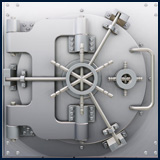Why Are Passwords Required?
Passwords are a pain to create, and for those of us whose memories have more holes than a colander, even more painful to remember. But consider, for a moment, all of the personal information protected by that password:
- Bank accounts
- Email accounts
- Online shopping
- Credit cards
In this technology rich age, even your children’s school grades are online. Without a strong password acting as the gate to the city, the thundering internet hordes have full access to your inner most details on the “net.” With just a few pieces of personally identifying information a savvy internet thief could be booking trips to Costa Rica, or worse, committing crimes, under your name and leaving you to pay the bill.
Problem With Creating Easy To Remember Passwords
Here’s the dilemma. How do you create a password, or twenty, that you’ll remember but no one else could ever guess?
Because the temptation is to:
- Use your birthday, your kids birthday, the name of your current pet, etc. You’ll remember those, for the most part. (Some of us try hard to forget our birthdays.)
- Use the same password for everything from logging into your email to logging into Amazon.com
Stand firm. Don’t give in to that temptation. If a hacker is able to crack your password for one online account, he or she willl use that password first in attempt to gain access to the rest of your protected information.
Another temptation to avoid at all costs: Writing your passwords down and placing them near your computer, say, under your keyboard.
So what do you do? Read on and we’ll do our best to help you.
General Rules For Creating Passwords
The most commonly used rules for creating passwords are below, but, some websites and applications may have their own rules regarding passwords.
Generally passwords are:
- Case Sensitive – This means that the upper-case letter a (A) is not the same as the lower-case letter a (a).
- No Spaces Allowed – Most applications do not allow blank spaces in the word.
- Special Characters – Characters such as a tilde (~) may or may not be allowed. Most applications will advise you if this is the case.
- Length – Most applications will tell you a minimum and maximum length of the password. Although you may be allowed to create a password that is four characters long, for security reasons it is recommended that the minimum length be greater than seven characters.
Creating Passwords That Won’t Be Easily Cracked
Here are some general guidelines to create a password:
- Your password should be longer than eight characters
- Mix letters , numbers and symbols
- Use upper-case and lower-case letters
- Do not create a password that contains a single word that is in the dictionary
- Do not use your name or a loved one’s name
- Use several words together (i.e. redyellowblue)
- Create a phrase (i.e. “I love Spot; he’s a good dog,” would become 1L$hA6d).
Notice in the phrase example, we substituted a number 1 for the letter “I,” a “$” for the “S,” and a “6” for the “G.” If you can remember the phrase, it’s a good chance you’ll remember the password.
Want a good idea of how strong your password is? You can use the password checker below to gauge the strength and effectiveness of your passwords. Don’t worry, your password will not be stored on this site or in this form.
These tips and tricks are to you by ComputerGeeks2Go. Feel free to print a copy and tack it to your wall or keep it in a handy file. If you need to share it though, we ask that you respect our copyright and give us credit with a link back to our website: http://www.computergeeks2go.com. Also, let us know! If you’re reprinting it, we’d love to post a link to your site.
 ComputerGeeks2Go
ComputerGeeks2Go
secure email service says:
I agree with you that remember password is such a brainstorming activity now-a-days, because we have several passwords for several accounts & it is really hard to manage them. I feel that combination of upper & lower case letters for password is the best way to keep our account safe & secure. Apart from that I really like your post, it consist all the necessary aspect to keep our password secure.
Thanks
Jon Bristow says:
Thanks! It can be a lot harder to remember passwords if they’re a mix of upper and lowercase, numbers and symbols, but it does give you a greater deal of security. Thanks for stopping by and taking the time to read and comment!
secure email service says:
It’s my pleasure Jon, I do agree with you that remembering those passwords which enclose upper & lower case letters are really tough for us but don’t you think so that it is the best way to keep our data safe & secure? Generally hackers use “Dictionary Words” to access our account & if we use upper & lower case letters then the possibilities of our account being compromised turn out to be much lesser.
Thanks
Jon Bristow says:
We wholeheartedly believe it’s a better way to protect your information. We frequently caution our clients and others who ask not to use things like phone numbers, pet names, birthdates, etc. as passwords. As easy as those are to remember, they’re equally easy to guess. We’re currently looking into things we can recommend to help those of us with poor memories remember our complex passwords!
http://Adrianart.com/ says:
Your entire post, “How to Create A Secure Password | ComputerGeeks2Go 101 Guides”
was indeed very well worth writing a comment down here in the comment section!
Simply just desired to admit you did a very
good work. Thanks a lot ,Rosalind
Jon says:
Thank you, Rosalind! I’m happy you found the article worth reading and commenting on.